Chester County Leadership: Thomas “Buck” Riley
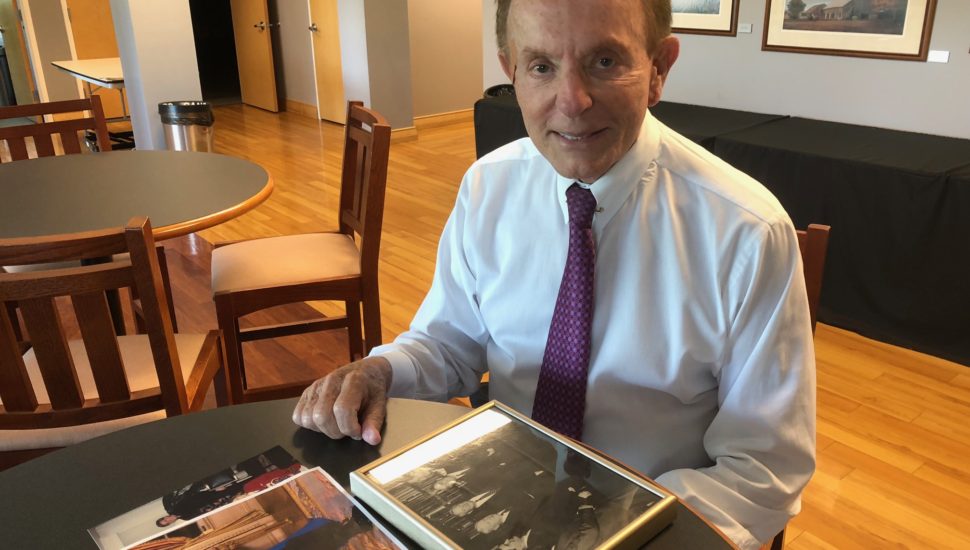
Thomas “Buck” Riley, Founder and former CEO of Riley Riper Hollin & Colagreco, speaks with Vista Today about his memories growing up on a farm and inheriting all farm duties at the age of sixteen, his destined, yet rocky path to becoming a lawyer, the strong relationships he had with his father and then father-in-law, and his new role working for Meridian Bank after 52 years in the law business:
Where were you born and where did you grow up, Buck?
I was born the oldest of four children in Westtown Township, on a 240-acre farm in 1939. My grandmother and grandfather owned the farm. After serving as a supply officer on a Destroyer Escort, in World War II, my father became a lawyer; first in West Chester, and then in Paoli before he became a judge in Chester County in 1960.
What memories do you have of World War II?
I remember many things such as my grandparents going down to a nearby civilian observation tower to stand watch to see if there were any enemy planes coming in. I also remember food rationing stamps and the night my father came home from the War.
What memories do you have of growing up on the farm?
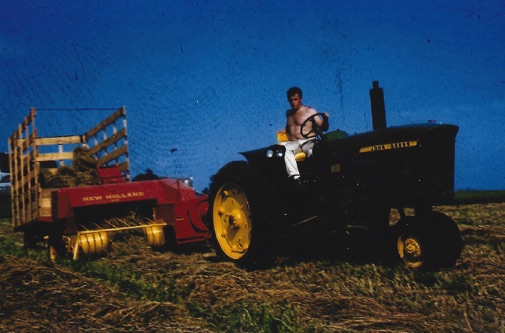 My grandfather was the one who was most involved with the farm. Even though I was just six and couldn’t reach the pedals, he put me on a Farmall H Tractor. He and a team of workers would be picking up bales that had been dropped by the baler while I steered the tractor. If they had to stop it, one of the men would run over and jump up on the tractor to hit the clutch pedal and brakes because I could not reach them.
My grandfather was the one who was most involved with the farm. Even though I was just six and couldn’t reach the pedals, he put me on a Farmall H Tractor. He and a team of workers would be picking up bales that had been dropped by the baler while I steered the tractor. If they had to stop it, one of the men would run over and jump up on the tractor to hit the clutch pedal and brakes because I could not reach them.
At one point when I was about twelve, my grandfather decided to buy a new set of equipment for the farm. At the time, there were two dealers in West Chester, the Farmall dealer and the John Deere dealership. He invited each one to come out to the farm separately and make a proposal on this whole new set of equipment.
I can still remember sitting on his porch the times the salespeople came to the house. It was a big order because it was two new tractors and a whole new line of machinery. They started talking to him, each one presenting differently, and he said to them, ‘don’t talk to me’. He pointed at me and said, ‘he’s going to make the decision.’ I was 12 years old at the time. I leaned toward John Deere equipment so we bought all new John Deere equipment.
In the spring when I would finish school on a Friday afternoon, I would come home, and while the other guys would be making plans to go to the movies, I’d go out and plow the fields into the night with the lights on the tractor to get a start on the weekend. Being on that big John Deere tractor was all I wanted to do.
How did you end up running the farm?
My grandmother called me one morning when I was sixteen years old and said, ‘I think your grandfather is dead. She said, ‘he fell over a few minutes ago and now he’s not breathing.’
A couple of days later after his funeral, my grandmother said, ‘what do you think?’ She was referring to the farm. And I said, ‘I think we can do it.’ It’s hard to believe but she let me take over the 240-acre farm with 30 head of Angus cows and 9 horses when I was just 16 years old!
What did your grandmother see in you at such a young age that allowed her to trust you?
Well, I think what they saw was that I had this tremendous overwhelming love of that farm and the animals. I just loved everything about it. It was so deeply embedded inside me.
I also think being allowed to operate large equipment at such a young age helped to instill a strong early connection to the farm.
And where do you think that love came from?
Well, when I was six years old, and just starting in 1st grade, my grandfather gave me a baby bull. I named him Billy Boy and he was mine to take care of. Every morning I would get up, before going to school, and I’d go to the barn to feed and brush Billy Boy.
How did your parents react to your grandmother’s decision to let you run the farm?
My parents were very happy about me running the farm in conjunction with my grandmother who handled the finances for me. Actually, in some respects my father who was a lawyer, was somewhat relieved that I had turned 16 just prior to my grandfather’s passing and now had a license to drive.
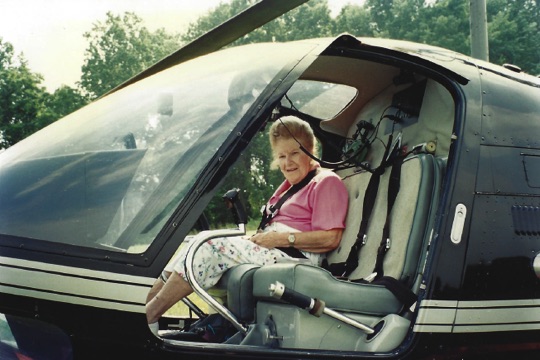
Prior to that time as early as when I was 13, I would be driving all the big John Deere tractors pulling a baler and wagon on local roads, some of which, were narrow and with various hills. I had to shift gears going up steep hills and double clutch the big John Deere tractor so that it wouldn’t stall.
My father was aware that I was driving on State and Township roads without a license and would occasionally say “do you know what would happen if you had an accident driving without a license and with no insurance?’
My response being that of an invincible teenager would be something like – ‘Well Dad, I really don’t intend to have an accident and furthermore, I don’t think I need a license to drive to drive farm equipment on the road. The conversation would quietly end with no resolution and I would continue to drive heavy farm equipment on local roads (thankfully with no accidents).
Looking back now, I realize how silly it was for a kid of 13 to be telling his father, a lawyer, what the law of Pennsylvania was.
Looking back, what lessons did you learn working on the farm?
Well, one thing that has stuck with me over the years is something I learned early on – that is “to love and lose”. When I was given that little baby male calf to feed and brush and care for every morning before school, I came to love that little guy – Billy Boy. I knew he looked forward to seeing me every morning as I did him. Then one morning when I got to the barn, he wasn’t there. My grandfather had sold him, and he was taken away while I was at school the previous day. When I tearfully questioned my grandfather as to why he had to go, he patiently explained to me that male calves were not needed on the farm. Their value was in being good for veal. So, then I had lost him, and worse yet, he was going to die.
That was a tough lesson for me at a young age, but a healthy part of growing up sooner than normal as that scenario repeated itself over and over. I think that love is embedded in every farmer. You can’t help but get close to the animals. They have personalities, and each one of them has their own separate way of approaching things. That was a big lesson for me. So, losing people over the course of my life has been a little easier because I learned very early “to love and lose”.
There’s an old adage, ‘there is nothing in life more certain than change’, and some people have a hard time dealing with it, but if you forecast that change will inevitably happen, not to be morbid, but you’ll be in a better position to deal with it.
Did you play any sports in high school?
I did, but not well! I was not a good athlete. I played football at Malvern Prep. I was also involved in track and field. I competed in the shot put and discus. I also played rugby in college as well.
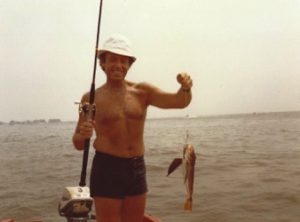 Interestingly enough, I went to St. Joe’s College and they didn’t have a rugby team. At the time, there was a British Villanova professor who wanted to start a team at Villanova, but the school would not sponsor it. They gave him a field on Lancaster Avenue, saying, ‘we will allow you to use the field, but we will not sponsor the team due to liability and too much money already going around to different teams. We will give you a field, you can play on a field, but the rest is up to you – uniforms, sponsors, and whatever else comes down the road’.
Interestingly enough, I went to St. Joe’s College and they didn’t have a rugby team. At the time, there was a British Villanova professor who wanted to start a team at Villanova, but the school would not sponsor it. They gave him a field on Lancaster Avenue, saying, ‘we will allow you to use the field, but we will not sponsor the team due to liability and too much money already going around to different teams. We will give you a field, you can play on a field, but the rest is up to you – uniforms, sponsors, and whatever else comes down the road’.
Most of the guys I went to Malvern with went to Villanova, and I was kind of the odd person out at St. Joe’s. That was principally because my dad went to St. Joe’s and was a star athlete there in track and field.
My friends at Villanova asked me to come play rugby with the team and I said, ‘I can’t, I don’t go to Villanova.’ They said, ‘don’t worry, the school won’t sponsor us so you can come play with us.’ So, I played rugby for Villanova for three years while being a student of St. Joe’s College.
We had no idea what the hell we were doing! We just played hard and rough. In my last year, though, we wound up winning our segment of the eastern rugby union tournament against the Ivy League schools – all of whom were more skilled than we, We’d play the Ivy League Schools in New York’s Central Park on Saturdays.
I was going out with a girl from Short Hills, NJ and one of the other guys was going out with a girl from New York City, and they would put us up at their parents’ homes on Friday nights. We’d play the games on Saturdays, and then on Saturday nights, we’d all go out to dinner together after the games. It was terrific.
What kind of music were you listening to growing up, Buck?
Interestingly enough, we used to play music in the barn all the time for the cows. The music was very soothing for the cows. We called it hillbilly music, but it would be known as country music today. We had an old beat up radio in the barn. We’d turn it on when the cows came in and they just seemed to find it very soothing.
I always liked rock ‘n roll music – so we’d play ‘50’s rock and roll music in the Ford pick-up truck, and also “hillbilly music”, occasionally. The ‘50’s were the marvelous time in my life. Post Second World War, things were pretty calm. In the ‘60’s everything went nuts. The music, drugs, Vietnam War, President Kennedy’s assassination, violent student protests and more.
Did you have a favorite artist?
Not really – it was just music all great rock ‘n roll. Down the line, I got into the Kenny Rogers era. My favorite today in country music would be Toby Keith. Fortuitously, I became friends with Chubby Checker, and his wife Katarina – former Miss World, and we’re still friends today.
Did St. Joe’s end up being a good choice for you?
St. Joe’s was great because it was very disciplined academically. I think I would have screwed off a lot more if I went to Villanova because there were too many buddies of mine from high school to party with there. St. Joe’s when I was there, was not a rich-guy’s school by any means. It was middle class families from North Philadelphia or over the bridge in New Jersey. I never really made many friends there because I lived in West Chester, far away from where most of my classmates at St. Joe’s lived. Jesuits were very disciplined, and there were many Jesuits teaching there back then.
How did you decide to be a lawyer?
I wanted to go into farming. A friend of mine was going into farming with me. Not here though, in PA. We were going to go into the Midwest and stake a claim on land there. My friend was much more into dealing with animals, his dad was a veterinarian. My friend was going to do the animal growing part, and I was going to deal with the equipment and planting crops.
Hearing my plans, my father said to me, ‘you know, Buck, if you go into law and you don’t like it, you can always go back into farming because you know farming. But, if you go into farming, and find out after two or three years that you made a mistake, you aren’t going to be able to go into law’. Back in those days you just didn’t skip a couple of years after college and then go to law school.
That just made so much logical sense to me, so I decided to try it. I liked law, so I got into it.
What is it about law that drew you in?
I think it was my uncle Ted Rogers, who was the county solicitor at the time, who turned me on to it. I worked for him for the summer between first and second years in law school. I decided to give it a try. My uncle just had a way about him that was so appealing, helping people, but also getting paid. My father was much more of a “don’t charge them much” kind of person. I think the most he made in his life was $35,000 in one year.
I liked the challenge of the law. It was challenging to get involved in a case and see if you can present it in such a way that you can convince a judge that your client should win.
Was getting into law school easy?
When I applied to law school, I had the second lowest aptitude test in my class. When I was interviewed, I didn’t know what the interview was going to be about. I was interviewed by a man named Professor Tom O’Toole, a Harvard graduate law professor who was vice dean of Villanova Law School. Brilliant guy. He was interviewing me, and he had my resume and my marks from St. Joe’s. I almost flunked out of St. Joe’s at one point because I was busy with the farm taking care of the animals, getting the crops in, playing rugby and going to parties.
Professor O’Toole looked at me in the interview and he said, ‘can you read or write? Look at this. You got a C in this. You got a C+ in this. ‘Well, in the last two years, I had worked my tail off and made the Dean’s List at St. Joe’s. But he didn’t bother to mention that.
He said, ‘I shouldn’t let you in here. You should try to get into Temple. You can probably get into Dickinson. Why should I take a chance on you? It’s clear that you are mentally lazy. Most likely, you’re going to flunk out of here. You’ll either be at the top of your class, or you’ll flunk out, and my guess is that you’ll flunk out.’
He asked me if there was anyone at St. Joe’s College that could say a good word about me. I thought, ‘oh man.’ I pulled up the name of a marvelous professor whose class I thoroughly enjoyed. I said, “Yes. I am sure Dr. Dougherty will say something good about me.” And he said, “Oh, come on. Jim Dougherty will say a good word about anybody.” He just happened to personally know, Dr. Jim Dougherty.
Then he said, “No, I’m talking about someone who is tough.” Then I said, “I’ll tell you what. What about Father Sullivan, the dean?” He said, “if you can get a letter from the dean, Father Sullivan, recommending you, I’ll let you in here.”
I got up and left and thought to myself, “how the hell am I going to do that – get a letter of recommendation from Father Sullivan?” So, I get back to St. Joe’s and go right to the secretary’s office. I make an appointment to see Father Sullivan. I remembered when I first went in at St. Joe’s, there was mandatory athletics or something. I had asked to be excused from it because I was working on the farm. I had to talk to the Dean to get this granted. Turned out, he had worked on a farm while in school. He was so taken with my work on the farm.
When I went to see him, he remembered me. I told him the story of my interview. He said, “well let’s take a look.” Thank God, the only thing he looked at was my last two years – where I had made Dean’s List! He said, ‘well, I don’t know what’s so bad about this. You wound up making the Dean’s list’, and he agreed to write the letter.
That’s how I got into law school. I graduated exactly in the middle of the class, so I guess that Professor Tom O’Toole was not correct in his prediction that I would either go to the top or flunk out.
What was the edge that you brought to the law?
Having the good fortune to be able to watch my father and my Uncle Ted Rogers, both of whom were learned and became very well respected judges. Strangely enough, as timid as I was when I first started, I developed the ability to speak well over time. I think as crazy as it may seem, that stupid thing Bill Green and I got involved in on a whim, beating those guys from the top of the class even though we had no business being there.
Have you always felt comfortable presenting to a group, such as a jury?
No. I haven’t. I was scared to death as late as my first year in law school. We had to do these mandatory amateur court practices. I was so scared; I was almost apoplectic. I could hardly get the words out of my mouth.
Bill Green, who would later become Mayor of Philadelphia, and I were good friends. The following year he said, ‘why don’t you and I get in this competition?’ I thought he was most certainly joking as neither one of us was an academic genius.
So I said, ‘you know, what the hell.’ We wound up going all the way to the finals, beating many skilled teams along the way. We lost in the finals, but I definitely overcame my fear of public speaking.
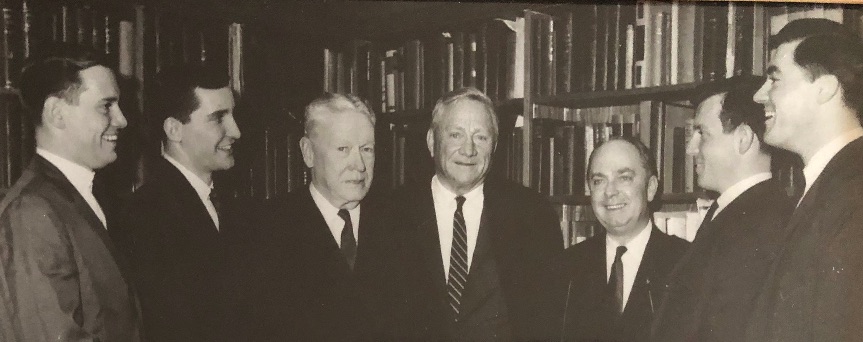
Buck, who were the people who propelled your career?
Well, my grandmother gave me the shot of running a major farm operation when my grandfather died. How many people would turn that kind of a huge operation to a sixteen-year-old kid?
The two people who really significantly made a difference after that are my father and father-in-law. My father was a wonderful man and was probably the most interesting and marvelous person in my lifetime. He was a judge. I could be tempted to say I built my law practice on my own, but when you’re the son of one of three judges in the county, it’s a lot easier for you than somebody else.
My father died when I was 31 years-old, there were 800 people at his viewing. It was a cold, rainy night in February in Malvern, and the people who came to pay their respects were standing out on the sidewalk. I’d go out periodically and tell them that things were going slowly inside, but they would say, ‘no we’re alright, Buck – we’ll stay’. They all signed the book, and that’s how I knew it was over 800 people. The next day the church at St. Simon and Jude was filled to capacity for his funeral Mass.
The other person who impacted my career was my then father-in-law, John Connelly. I admired him greatly. He was an incredibly talented business man. He was as straight as they come, tough as nails, yet everything was very simple. He ran a Fortune 200 world-wide company, Crown Cork and Seal Co. Inc., a can manufacturer. It was a nickel and dime business, no glamour. He was a tough guy. He worked hard and expected everyone around him to work as hard.
He wanted me to quit law practice and become president of Connelly Containers, another public company which he controlled. I thought long and hard, but decided for personal reasons that it wasn’t a good idea.
There were just so many marvelous things that I was exposed to business-wise at a young age that I would never be exposed to under most circumstances. I’d say those two people – my father and my then father-in-law were my biggest sources of influence.
Without sounding too dramatic or self-deprecating, I’ve come to realize that with all the things that have been given to me in my lifetime, I have not gone very far. Recently, I saw a handicapped gentleman getting out of a van equipped for a handicapped driver, crutches in hand and braces on both legs. I happen to know he owns his own business. I watched him shuffle along unsteadily supporting himself with his crutches. I thought to myself, I’ve lived a marvelous life and I’ve been given so much (great health, wonderful education, decent looks, ability to express myself well, great parents, and wonderful children).
When I see people who have achieved against the odds, and how hard they’ve worked to get there, it’s equally mind-blowing and humbling. It also reminds me to keep my mouth closed and not utter a word of complaint about anything but rather to be so thankful for all of the gifts I have been given.
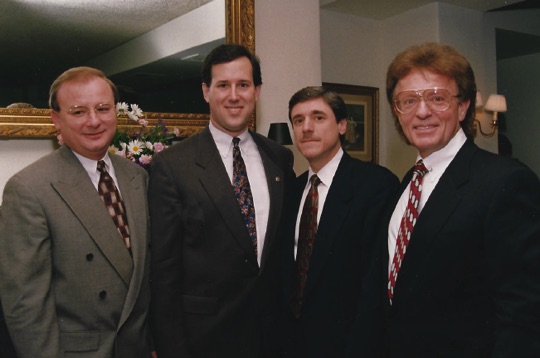
Have you ever considered running for political office?
When I decided to stay in law practice, my father told me ‘look you’re going to get involved in political things someplace in some way, shape or form because that’s just the way it happens in Chester County with lawyers. It’s one thing to consider running for office. I caution you though, not to run for an office in which you can’t afford to live on the amount of money it pays. Because, if you can’t, you’re going to be governed by the people who put up the money for you to run for office. You’re not going to be truly independent’.
That always stuck with me. I’m not patting myself on the back, but over time I’ve been asked to run for several different offices, and those words of my father have always been in the front of my mind. Now I see how people are beholden to the people putting up money for them. Because of my father’s guidance, I’ve stayed in the political realm, in the background.
Have you ever considered retiring?
My father-in-law said to me one night, ‘Buck, don’t ever retire.’ I thought to myself, everyone retires. You work for a company until you’re 65, retire, get a pension. I had heard people say to him, ‘John another 18 months to go, and then I’m going to retire’, and he’d say back to them, ‘what are you going to do then? Die?’
I can’t tell you how many times I heard him say, ‘well what are you going to do after that? Die?’ and they’d say, ‘I’m going to travel, play some golf’ and he would respond by saying, ‘and then you’re going to die, right?’ Oh. He was brutal. He told me that retirement was bull**** and the only thing that happens after you retire is that you’re going to die.
He said if you’re finished working for a company, do something else. Don’t retire. When you retire, the next meaningful thing that happens in your life is that you die. That has always been in my thinking. Also, farmers never retire; the farm always kept going. It was always shocking to hear him say it to other people, though.
I spent 52 years practicing law, and I had a lot of success, won a lot of cases. I said to the folks in my office; I don’t have any more hills to climb. I won the first million dollar verdict that ever came down in Chester County. I’ve won the highest verdict in Chester County. I can drive around and look at this development and that development that I got approved. I said to myself, ‘I want to do something entirely different’.
So, in any event, I decided to talk to Chris Annas, Founder and CEO of Meridian Bank – a friend – simply to get some ideas. I arranged a lunch meeting to talk to him to see what might be out there that would be interesting to do. He said, ‘why don’t you consider coming to work for us?’ I said, ‘I don’t want to review any documents, I don’t want to try any cases, I don’t want to be anyone’s boss.’
I thought he was talking about legal work! I had never worked for anybody in my life, ever. He said, ‘I think we can make this work’, so we talked some more about it. With the experience I had from Connelly and my other business experience, I was able to recognize what a great organization Meridian is.
Chris has put together a top-notch company here. It’s the combination of the younger and older employees, who are all very smart and ambitious in a good, healthy way. He’s developed this concept of a community bank that can offer the services of a larger bank, but still stay nimble and humble. Chris has developed a great competitive advantage at Meridian. Where all the big banks have a great deal of continuing expense in real estate around, a branch on every corner, and all the paid tellers to staff them. Now that everything is going online, the big banks are trying to get rid of the real estate and get rid of the overhead. He doesn’t have that overhead. Part of Meridian’s strategy is maintaining a limited branch network – just one office per county, and one now in Philadelphia.
What do you bring to the table within the bank?
Chris said to me – and I think this is part of his genius – ‘there’s a lot of people out there that we know but we don’t have any contact with them or any relationship. You have developed relationships with a lot of these people that we know, but we have no way to get to. I think you can open doors for Meridian in places in which we have not current access.’
I built my own firm, and it was, and still is, very successful. And so, I believe I can help, going forward, in expanding Meridian, just with the instincts I’ve developed over the years. The practice of law just didn’t interest me anymore after 52 years. Building the firm was what I liked about it. The group of people who are currently at the firm are marvelously talented people. I see what Chris has developed at Meridian, and I believe I can help him get to the next level.
Finally, Buck, what is the best piece of advice you ever received?
The first piece of advice was what my father told me about running for office. Had my father not given me that warning, there is no question that I would have succumbed to the idea of running for some political office. People blow smoke at you all the time, so I’m sure I would have gone for it and lived to regret it.
The second piece of advice is what my father-in-law said about retiring. Without that advice, I would have moved toward retirement when I decided to no longer practice law. The so-called “golden years” and all. But he drilled his belief into me by confronting other people with it. He wasn’t necessarily giving me advice; I just happened to be listening to it when other people were being shocked by it.
So, I’m now on to a brand new career and loving it.
Connect With Your Community
Subscribe to stay informed!
"*" indicates required fields









![95000-1023_ACJ_BannerAd[1]](https://vista.today/wp-content/uploads/2023/03/95000-1023_ACJ_BannerAd1.jpg)






































